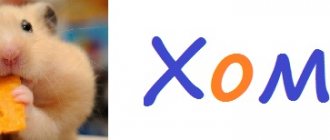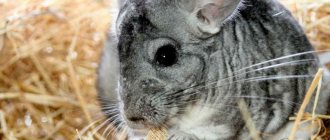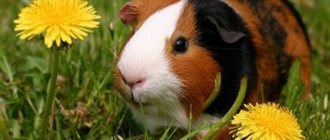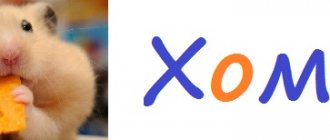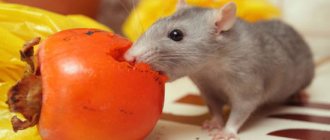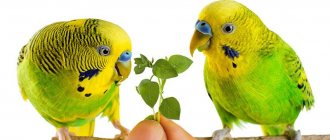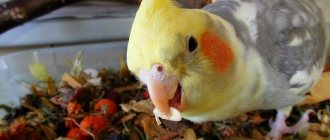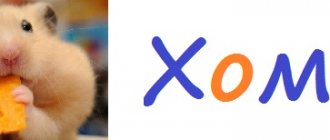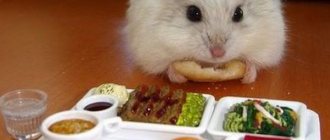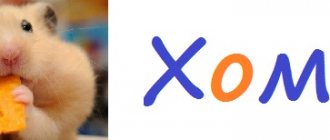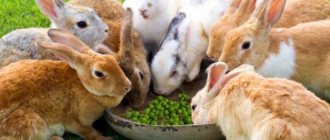- home
- Parrot
- Feeding
04/23/2019 Many people feed street birds - sparrows, pigeons, ducks - with bread, and they happily peck at it. But parrot owners are unsure whether this food will benefit their exotic pets. Before giving your pet an unusual treat, you need to look for additional information to find out if it is safe for his health.
Is it possible or not?
Before answering the question of whether it is possible to feed a parrot bread, you need to know the main varieties of this delicacy:
- wheat (white);
- rye (black);
- wheat-rye;
- bran;
- wholegrain.
Two types of bread, different in composition and properties, prevail over others: black and white. I analyzed their effect on the gastrointestinal tract of poultry.
Is it possible to feed a budgie with bread?
White contains wheat flour, yeast, salt and sugar. An industrial product may additionally contain milk, vinegar, vegetable oils and margarine, spices, and chemical additives. Products made from white flour contain mainly starch and a meager amount of vitamins and minerals.
Black bread is made from rye flour, yeast, malt and salt. Such baked goods include many essential amino acids, vitamins B and PP, zinc, manganese, and phosphorus.
Now let's look at how the composition and type of such a product affects the health of our pets.
Every baked goods recipe contains yeast, flour, eggs, sugar, and salt. These spices are poorly digested, which leads to disruption of the microflora in the pet's stomach. This is a double-edged sword. Despite the fact that the composition of bread crumbs has an adverse effect on parrots, it is advisable to include them in the menu. The point lies in the variety and dose that the chick is allowed to peck per day.
Prohibited Products
When feeding your budgie, be sure to take into account the fact that its body is not designed for many of the foods we are accustomed to. After all, poultry digestion is mainly aimed at processing various grains. Here is a list of foods that should absolutely not be given to wavy pets due to their high content of harmful substances:
- milk (cream),
- cheese (especially salted),
- coffee,
- alcoholic drinks,
- potato,
- chocolate,
- fried foods,
- fatty foods,
- salty foods,
- sweet products,
- sausage (sausages),
- meat - in rare cases, you can give the parrot a piece of boiled chicken,
- fruits: avocado, mango, papaya, persimmon,
- spices,
- spinach,
- nuts,
- seeds of apples, pears,
- onion,
- garlic,
- mushrooms.
What does your parrot like to eat?
If you liked the article, share it with your friends and like it.
Can parrots eat black bread?
Despite the composition rich in useful substances, consumption of products made from rye flour by any bird can cause irreparable harm to its health. The reason for this is the high acidity of the product. It causes fermentation processes in the gastrointestinal tract, leading to disruption of microflora, bloating, and exacerbation of helminthic and viral diseases.
This product also contains a lot of starch and salt - substances that are difficult for pets to digest. Their excess amount is not processed by the liver, accumulates in the body, leading to its poisoning and kidney failure. Igor Ignatenko
Due to the abundance of starch and low-molecular dextrins, baked goods made from such cereals swell greatly in the digestive organs of the bird. When consumed, the crumb of rye bread becomes very clogged with the bird's crop (the section into which food enters and where it is practically poisoned), an inflammatory process occurs, and breathing problems arise. Descending lower along the gastrointestinal tract, the sticky mass clogs the patency, causing bloating and volvulus.
I concluded that giving such a treat to feathered pets is prohibited.
What happens if you give your parrot black bread?
Is there any harm
If a parrot has stomach problems, such as high acidity, then apples should be abandoned in favor of fruits with a more gentle composition: bananas, peaches, plums, etc.
The fruits should also not be given to immature young animals who have not yet begun to eat on their own. It is better to refrain from treating your pet with apple seeds. The seeds contain amygdalin glycoside, which releases toxic substances when processed. They will not cause harm to the body of adults and large individuals, such as cockatoos, macaws or African grays, but small birds - lovebirds or budgerigars - can be poisoned.
Some parrots cannot tolerate certain elements in principle, which is expressed by allergic reactions of various kinds. Therefore, before including apples in the diet, it makes sense to give your pet a small piece to try.
The fruit selection procedure deserves special mention. It often happens that a beautiful-looking and tasty fruit turns out to be a carrier of dangerous substances. And if the human stomach has more or less adapted to pesticides and other chemicals, then the gastrointestinal tract of a bird can cause serious problems, and in difficult cases lead to death.
Key points when choosing apples:
- presence of damage;
- elasticity;
- color;
- size;
- smell.
There should be no dents or dark spots on the surface. If, when you press on the peel, it bends easily, then most likely the apple is not fresh. Too bright colors should immediately alert you. Good fruits have a uniform and non-flashy color.
Better to give up the giants. Large sizes are largely the result of chemicals, not agricultural technology. The best option is a medium-sized apple. The fruits must emit a characteristic aroma for the crop. The abundance of chemicals partially neutralizes the smell, so its absence is a bad sign.
Some people are afraid of radionuclides in apples and GMOs. In fact, these are unfounded fears. Radionuclides accumulate only in the soil, and apples grow on trees. Given the existing varietal diversity, improving apples at the genetic level is simply unprofitable. It is more practical to carry out another selection.
Can budgies eat white bread?
Products made from wheat flour do not have such a detrimental effect on the esophagus of a pet. They have much less acidity and contain a minimal amount of chemical additives and salt.
White bread is considered safe for pets. It contains many useful substances:
- 4.5-8% protein;
- 33% essential amino acids;
- 1.5-2% fat;
- 25-30% B vitamins;
- 23-30% minerals.
But the benefits of baking occur when the portions are small and are rarely present on the menu.
This delicacy is porous and fluffy, so it does not irritate the gastrointestinal tract as aggressively as the very sticky crumb of rye bread.
Read also
Waka food for parrots
However, you need to remember about the high content of gluten and starch in the composition, especially in a freshly baked product. Excessive consumption can lead to sticking of the walls of the internal organs of birds.
The low nutritional value of white flour products, when consumed in abundance, can lead to hypovitaminosis D, E, and a lack of manganese in the body. Due to a lack of calcium, the development of rickets, skeletal deformations of young individuals, and decreased egg production in females are possible.
Moderate consumption of the product will not cause much harm to the bird.
Only as a delicacy - but not part of the menu!
It is given exclusively in dried, crushed form. It is better to use crackers as a reward treat during training, or add them to egg and vegetable mash. In the latter case, this increases the friability of the mixture and shelf life. The treat should not have mold, since most forms of it are real poison for birds.
What else can you give?
The diet is based on grain crops. The standard daily dose for small animals such as budgies or cockatiels is 20 g of food. Pet stores sell ready-made mixtures for feeding birds, but if you wish, you can prepare it yourself.
Standard feed mixture includes:
- Sunflower seeds. Use only raw, fried is prohibited. Due to the increased oiliness, it is recommended to limit the amount of seeds in the diet, although pets themselves love them very much.
- Sprouted grains. They have useful substances and are especially useful in winter, when birds lack vitamins.
- Millet. It is the main ingredient of any feed mixture.
- Oats. Allowed both in purified and unpurified form. The latter is preferable, since the birds will like to peck at the shell and extract the grains from there.
In addition to grain food, birds are offered juicy food: fruits, vegetables and herbs. It is allowed to feed your pet pieces of apples, carrots, strawberries, lettuce and sorrel leaves, dill and parsley. Fruits contain large amounts of fructose (plant sugar), so sweet berries should be offered occasionally as a special treat.
In addition, birds will benefit from protein foods of animal origin. For example, a hard-boiled egg or a little cottage cheese. It is necessary to observe moderation and not offer your pets too many of these products.
Fresh drinking water must be in the cage at all times. To ensure the health of your pet, it is necessary to change the water every day and periodically wash the drinking bowl to prevent the formation of plaque or mold.
Feed rate per day
The cockatiel is a medium-sized parrot and can eat approximately 30g of food per day. This is the total amount for an adult: 2 teaspoons of grain mixture, succulent food, grass. If the bird does not empty the feeder during the day, you need to reduce the portion. Feed poured in the morning should not be left overnight. It is thrown away, the feeding container is cleaned and a small amount of dry assortment is added before bedtime so that the pet can satisfy its hunger after waking up.
It is quite difficult to feed such a picky bird as a cockatiel. She is also suspicious of colored granules in ready-made mixtures, and unfamiliar fruits, vegetables, and foods with an unusual smell. And yet, an impressive list of what you can feed your cockatiel allows you to create a complete diet, healthy and nutritious.
Veterinarian's opinion
Whether a parrot can bake baked goods is a controversial question. The opinion of veterinarians is that a small amount will not harm. However, you must follow some rules:
give up rye;
it cannot be fresh in any form;
do not give to a hungry pet;
You need to understand that a parrot is a bird. Her digestive system is designed for other foods. Salt is very harmful; a small amount for humans can be fatal for birds.
Many people believe that the parrot itself determines what and how it eats. In the wild, maybe, but domesticated, no longer. Therefore, it is a person’s responsibility to monitor whether a parrot can eat bread.
Bread should be given to your pet carefully. They love to eat with people. But that doesn't mean human food is okay. A parrot has a different digestive system, so the food must be suitable for it.
https://popugaitut.ru/kormlenie/mozhno-li-davat-popugayu-hlebhttps://ptitsadoma.ru/volnistye-popugai/mozhno-li-hleb.htmlhttps://www.zoospravka.ru/Ano_18/mozhno- li-hleb-volnistym-popugayam.htm
